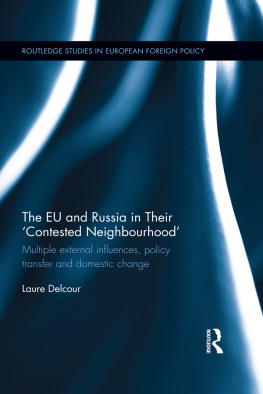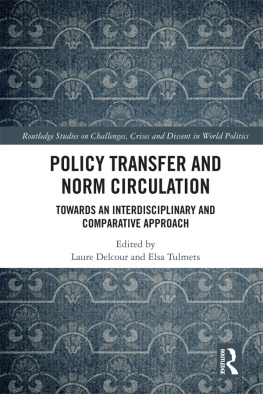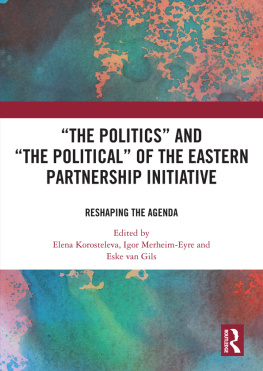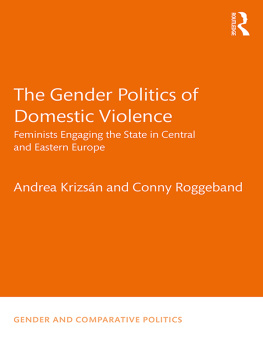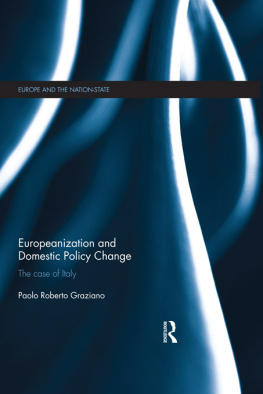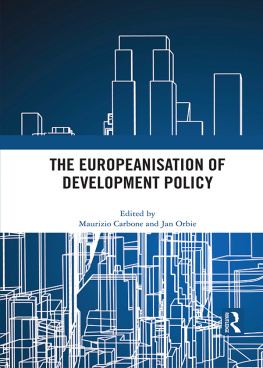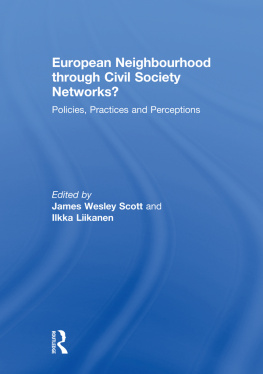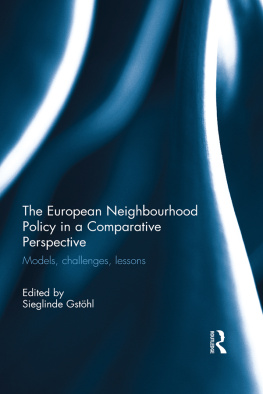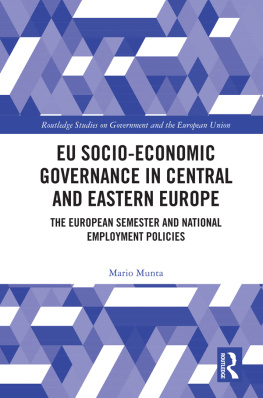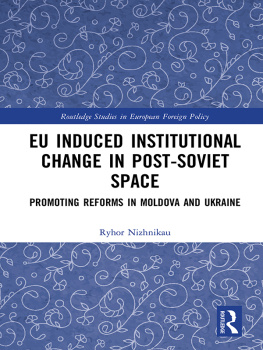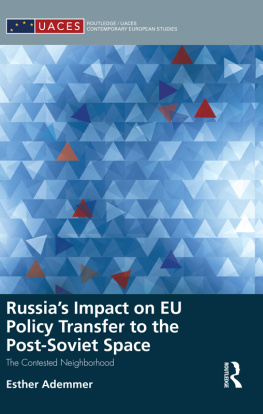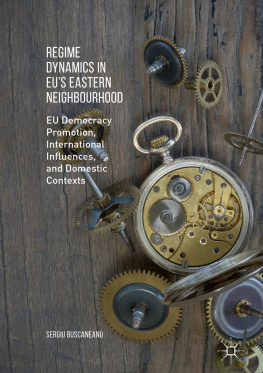The EU and Russia in Their Contested Neighbourhood
The literature on the European Unions influence in its Eastern neighbourhood has tended to focus on EU-level policies and prioritise EU-related variables. This book seeks to overcome this EU-centric approach by connecting EU policy transfer to the domestic and regional environment in which it unfolds. It looks at the way in which the EU seeks to influence domestic change in the post-Soviet countries participating in the European Neighbourhood Policy/Eastern Partnership and domestic receptivity to EU policies and templates. It seeks to disentangle the various dynamics behind domestic change (or lack thereof) in Eastern Partnership countries, including EU policy mechanisms, domestic elites preferences and strategies, regional interdepen-dences and Russias policies. Based upon extensive empirical investigation on EU policies in four countries: Armenia, Georgia, Moldova and Ukraineand in two pivotal policy sectorsthe book provides systematic and nuanced understanding of complex forces at work in the policy transfer process.
This text will be of key interest to scholars and students of international relations, European studies, democratization studies, and East European Politics and area studies, particularly post-Soviet/Eurasian studies.
Laure Delcour is Scientific Coordinator and Senior Research Fellow under the EU-funded FP7 project Exploring the Security-Democracy Nexus in the Caucasus (project CASCADE, FMSH, Paris).
Routledge Studies in European Foreign Policy
Series Editors:
Richard Whitman, University of Kent, UK
Richard Youngs, University of Warwick, UK
This series addresses the standard range of conceptual and theoretical questions related to European foreign policy. At the same time, in response to the intensity of new policy developments, it endeavours to ensure that it also has a topical flavour, addressing the most important and evolving challenges to European foreign policy, in a way that will be relevant to the policy-making and think-tank communities.
1 The European Union in International Climate Change Politics
Still taking a lead?
Rdiger Wurzel, James Connelly and Duncan Liefferink
2 Theorizing the European Neighbourhood Policy
Sieglinde Gsthl and Simon Schunz
3 EU Security Missions and the Israeli-Palestinian Conflict
Amr Nasr El-Din
4 The EU and Russia in Their Contested Neighbourhood
Multiple external influences, policy transfer and domestic change
Laure Delcour
First published 2017
by Routledge
2 Park Square, Milton Park, Abingdon, Oxon OX14 4RN
and by Routledge
711 Third Avenue, New York, NY 10017
Routledge is an imprint of the Taylor & Francis Group, an informa business
2017 Laure Delcour
The right of Laure Delcour to be identified as author of this work has been asserted by her in accordance with sections 77 and 78 of the Copyright, Designs and Patents Act 1988.
All rights reserved. No part of this book may be reprinted or reproduced or utilised in any form or by any electronic, mechanical, or other means, now known or hereafter invented, including photocopying and recording, or in any information storage or retrieval system, without permission in writing from the publishers.
Trademark notice: Product or corporate names may be trademarks or registered trademarks, and are used only for identification and explanation without intent to infringe.
British Library Cataloguing in Publication Data
A catalogue record for this book is available from the British Library
Library of Congress Cataloging in Publication Data
A catalog record for this book has been requested
ISBN: 978-1-138-18557-9 (hbk)
ISBN: 978-1-315-64437-0 (ebk)
Typeset in Times New Roman
by Apex CoVantage, LLC
The research conducted for this book was supported by the French Agence Nationale de la Recherche under the project Exploring the Role of the EU in Domestic Change in Post-Soviet Countries (ANR-10-ORAR-0014) co-funded with the ESRC (UK), and by the European Unions Seventh Framework Programme (FP7/SSH.2013.4.1.-1) under the project Exploring the Security-Democracy Nexus in the Caucasus (CASCADE, grant 613354).
1
Introduction
Can the EU be effective in promoting domestic change beyond its borders and if so, under what conditions?
These questions have gained salience since the Union has stepped up its role in the post-Soviet space. With the European Neighbourhood Policy (ENP) created in 2004, and even more so with the Eastern Partnership (EaP) launched in 2009, the EU offers unprecedented guidance for reform combined with monitoring and benchmarking. The EU seeks to support political and economic reforms by facilitating approximation and convergence towards the European Union (Council of the European Union 2009) and diffusing its standards and rules to post-Soviet countries included in the ENP/EaP. Both the ENP and the EaP are premised on the view that the adoption of EU norms and rules will ultimately bring stability and prosperity to the EUs Eastern neighbourhood, as was the case in post-war Western Europe and in post-Cold War Central and Eastern Europe.

